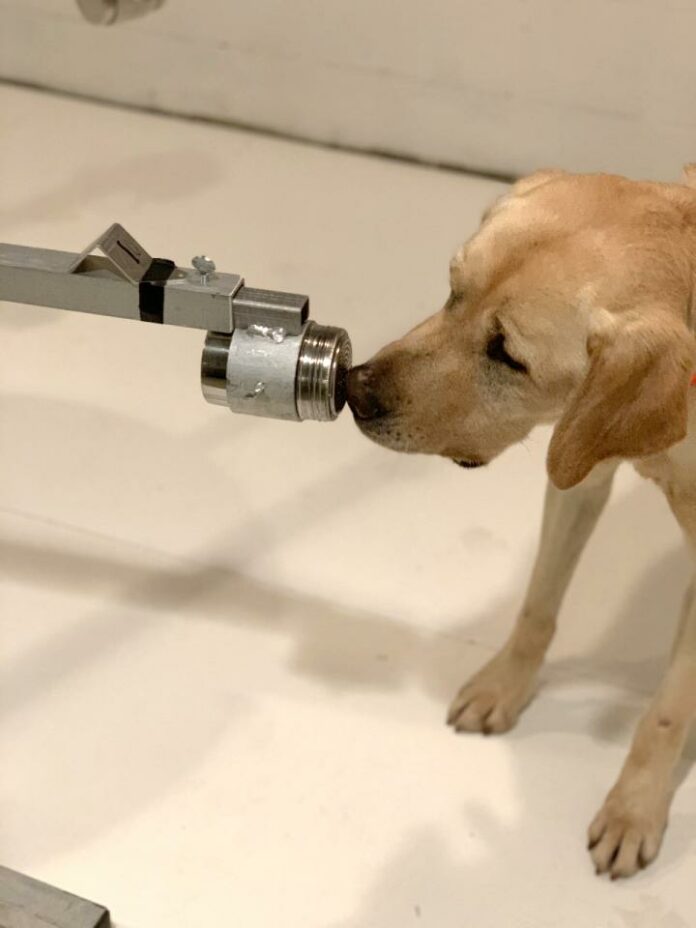
Researchers at the University of Pennsylvania trained dogs to sniff out COVID-19 from urine samples with a 96% accuracy.
Despite the availability of vaccines, COVID-19 continues to spread rapidly across the world. الروليت اون لاين Many countries are facing a third, more severe wave of infections. The unavailability of rapid and reliable coronavirus tests remains a vital factor in the spread of infections. Current diagnostic methods rely on RT-PCR testing; a test that often gives false negatives and false positives. Therefore, researchers are turning to tests based on volatile organic compounds (VOCs). لعب بوكر حقيقي Previous research has shown that SARS-CoV-2 has a specific scent that dogs can detect in saliva or tracheal samples. However, they are yet to test this ability on urine samples where the viral load is quite low. In the past, dogs have managed to sniff out several diseases from urine and saliva examples; including lethal prostate cancer. Now, a team at the University of Pennsylvania School has successfully trained dogs to sniff out COVID-19 from samples of urine.
This is not a simple thing we’re asking the dogs to do. Dogs have to be specific about detecting the odour of the infection, but they also have to generalize across the background odours of different people: men and women, adults and children, people of different ethnicities and geographies.
Cynthia Otto, senior author
Researchers trained eight Labrador retrievers and a Belgian Malinois for their study. The dogs had never taken part in any form of medical detection work before. First, through positive feedback techniques, the team trained dogs to recognize a universal detection compound (UDC). Once the dogs began responding to the UDC scent, researchers started training them to recognize urine samples of COVID-positive patients. 7 positives and 6 negative samples were taken to train the dogs.
Three Weeks Later
The study aimed to investigate whether the dogs can differentiate between positive and negative samples. Moreover, researchers also planned to determine whether the dogs trained on urine samples can detect coronavirus in saliva samples. All samples underwent treatment with heat or detergent to render the virus harmless.
The scent wheel, used to train the dogs, contained both the control sample and the target odour. Other scenarios were also presented to the dogs where all the ports in the scent wheel contained all control odours.
After three weeks of training, the dogs could sniff out the COVID-19 positive samples with a 96% accuracy on average. However, the overall sensitivity was only 68% that means there were a high number of false negatives. A result that researchers blamed on the strict study design. Moreover, the dogs only received training on repeated samples; thus, there is a possibility they will face a difficulty when generalizing the odor to new samples. Therefore, researchers call for training on a diverse set of samples in the future. اسرار لعبة الروليت
The team is currently working on ‘the T-shirt study’ where they’re training dogs to detect one’s status of infection and vaccination through shirts worn by people overnight.
Reference:
Essler JL, Kane SA, Nolan P, Akaho EH, Berna AZ, DeAngelo A, et al. (2021) Discrimination of SARS-CoV-2 infected patient samples by detection dogs: A proof of concept study. PLoS ONE 16(4): e0250158. https://doi.org/10.1371/journal.pone.0250158
Jendrny, P., Schulz, C., Twele, F. et al. Scent dog identification of samples from COVID-19 patients – a pilot study. BMC Infect Dis 20, 536 (2020). https://doi.org/10.1186/s12879-020-05281-3



